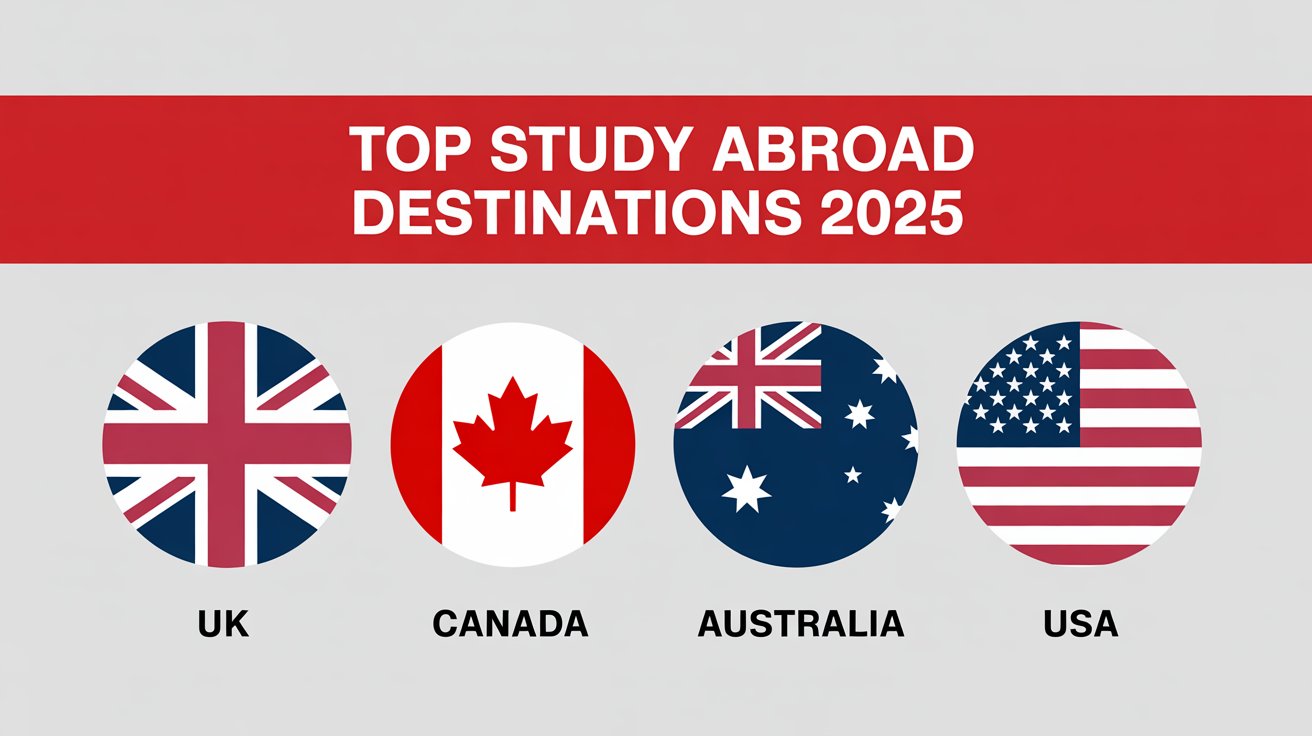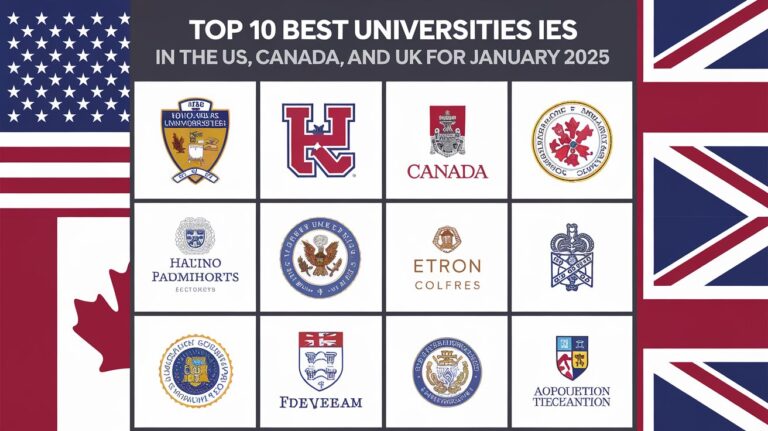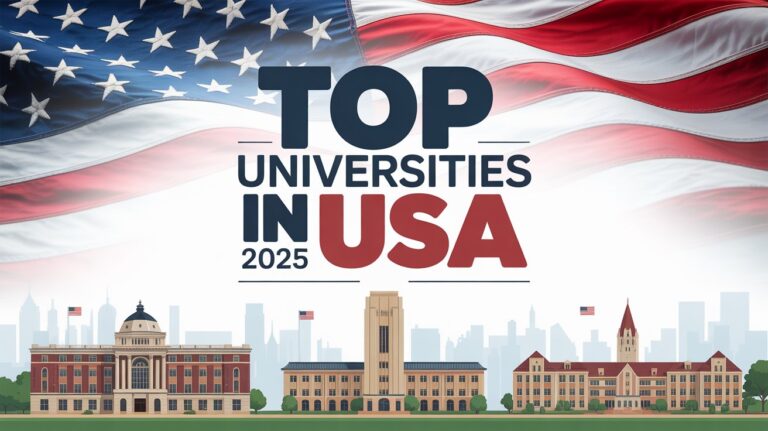Top Study Abroad Destinations 2025
Why Studying Abroad Is a Life-Changing Experience
Have you ever imagined waking up in a foreign country, walking to class at a prestigious international university, and building friendships with people from every corner of the globe? Studying abroad isn’t just about earning a degree – it’s about rewriting your life story with vibrant new chapters of discovery and growth.
As we look ahead to 2025, international education continues to transform from a luxury into a strategic necessity for career-minded students. The world has become our classroom, and crossing borders for education has never offered more advantages than it does now.
Career Benefits of International Education
Let’s face it – in today’s hypercompetitive job market, a domestic degree alone might not help you stand out from the crowd. Think of study abroad as your career superpower. According to recent research, graduates with international education experience earn, on average, 25% higher starting salaries than their peers who studied domestically.
“My semester at the University of Toronto completely transformed my resume,” shares Miguel, a recent international graduate. “During job interviews, recruiters spent more time asking about my international experience than anything else on my application. It became my unique selling point.”
When you study abroad, you’re not just learning academic content – you’re developing cultural intelligence, adaptability, language skills, and a global perspective that employers increasingly value in our interconnected world.
Personal Growth Through Cultural Immersion
Beyond the impressive resume boost, studying abroad reshapes who you are as a person. Imagine yourself navigating Tokyo’s metro system, ordering coffee in Italian, or celebrating Diwali with new friends in India. These experiences stretch your comfort zone like an elastic band – once expanded, it never returns to its original shape.
Study abroad is like upgrading your mental operating system. You’ll develop problem-solving abilities by navigating unfamiliar situations, enhance your communication skills by bridging cultural differences, and gain independence by building a life far from your established support networks. The confidence that comes from successfully living abroad is something money simply cannot buy.
Study in USA: The Land of Academic Excellence
When it comes to international education, the United States continues to be the heavyweight champion, drawing over a million international students annually. Why does study in USA remain so magnetic for global talent in 2025?
The American education system offers unmatched flexibility – unlike many countries where you must declare your major before entering university, US institutions typically give you time to explore different subjects before committing. Think of it as an academic buffet rather than a pre-ordered meal – you can sample various disciplines before filling your plate.
Top American Universities for International Students
While the Ivy League universities (Harvard, Yale, Princeton, etc.) capture most headlines, America’s excellence extends far beyond these eight institutions. Schools like University of Michigan, UCLA, and Georgia Tech offer world-class education with slightly less competitive admissions.
For 2025, these US universities stand out for international students:
- New York University – Leading in international student integration with nearly 20% of its student body from abroad
- Arizona State University – Pioneer in innovation and affordability
- University of California, Berkeley – Research powerhouse with strong tech connections
- Boston University – Urban campus with exceptional global programs
- University of Texas at Austin – Excellent value with top-tier academics
Scholarships Available for International Students in the US
Financing remains the biggest hurdle for most international students considering the USA. The good news? The scholarship landscape continues to expand. In 2025, these scholarships stand out:
- Fulbright Foreign Student Program – The gold standard in international education funding
- The Next Genius Foundation Scholarship – Full undergraduate scholarships for exceptional students
- Hubert H. Humphrey Fellowship Program – For young professionals seeking non-degree study
- The Education USA Opportunity Funds program – For talented students with financial need
Many American universities also offer merit-based scholarships specifically for international applicants, with some covering full tuition and living expenses.
Study in UK: Tradition Meets Innovation
The United Kingdom offers a unique blend of historic academic tradition and cutting-edge research. Imagine studying literature in libraries where Shakespeare’s contemporaries once read, or conducting scientific research in labs connected to Einstein and Hawking’s legacies.
The British Education System: Unique Advantages
The UK education system stands out for its efficiency and focus. Most undergraduate degrees take just three years (compared to four in the US and Canada), allowing you to enter the workforce more quickly and with less total expense. Master’s programs are typically one year instead of two, creating significant cost savings.
British education emphasizes independent study and specialized knowledge. You’ll spend less time in classrooms and more time developing independent research skills. Think of it as the difference between guided tours and self-exploration – both valuable, but developing different skills.
Most Affordable UK Cities for International Students
London’s world-class universities come with world-class living costs. However, studying in cities like Manchester, Birmingham, or Glasgow can reduce your living expenses by up to 40% while still providing excellent education quality.
For 2025, these UK cities offer the best value for international students:
- Manchester – Home to one of the largest student populations in Europe
- Edinburgh – Scotland’s stunning capital with several top-ranked universities
- Sheffield – Affordable living with exceptional student satisfaction ratings
- Cardiff – Welsh capital with vibrant culture and lower costs than England
- Belfast – Northern Ireland’s hub with significantly lower tuition for many programs
Study in Canada: Quality Education with Immigration Pathways
Canada has emerged as the rising star of international education, with its international student population more than tripling in the past decade. What makes the Great White North such an attractive destination in 2025?
The Canadian approach blends American and British educational traditions while adding uniquely Canadian advantages – particularly when it comes to immigration opportunities. After graduation, international students can access work permits and pathways to permanent residency that are among the most generous in the developed world.
Top Canadian Universities Making Waves in 2025
Canadian universities offer world-class education without the extreme price tags of their American counterparts. These institutions stand out for international students in 2025:
- University of Toronto – Canada’s highest-ranked university with particular strengths in research and innovation
- University of British Columbia – Spectacular Vancouver campus with leading sustainability initiatives
- McGill University – Montreal’s historic institution with strong global connections
- University of Waterloo – Cooperative education pioneer with unmatched industry partnerships
- University of Alberta – Research excellence with more affordable tuition and living costs
How to Navigate the Canadian Student Visa Process
The Canadian study permit process involves several steps, but it’s generally more straightforward than many competitors:
- Secure an acceptance letter from a Designated Learning Institution (DLI)
- Prove you have enough funds for tuition and living expenses (approximately CAD $10,000 per year beyond tuition)
- Obtain a police certificate and medical examination if required
- Submit your application online or through a Visa Application Center
Canada’s Student Direct Stream (SDS) offers expedited processing for students from certain countries, including China, India, the Philippines, and Vietnam, often providing decisions within 20 calendar days.
Study in Australia: Academic Excellence in the Southern Hemisphere
Australia offers world-class education with an unbeatable lifestyle. Picture yourself studying marine biology near the Great Barrier Reef, or taking business classes before heading to iconic Bondi Beach for an afternoon surf session.
Australian University Rankings and Specialties
The “Group of Eight” universities represent Australia’s elite institutions, all ranking in the global top 100. These universities particularly excel in natural sciences, engineering, and research.
For 2025, these Australian universities offer exceptional opportunities for international students:
- University of Melbourne – Australia’s highest-ranked university with comprehensive excellence
- Australian National University – Research intensity with close government connections
- University of Sydney – Historic campus with cutting-edge facilities
- Monash University – Leader in internationalization with campuses across continents
- University of Queensland – Scientific research powerhouse with beautiful Brisbane location
Work Opportunities for International Students in Australia
Australia allows international students to work up to 24 hours per week during the semester and unlimited hours during breaks. This policy helps offset living costs while providing valuable local work experience.
Post-graduation work rights range from 2-6 years depending on your qualification level and location of study, offering ample time to gain professional experience or pursue permanent residency pathways.
Emerging Study Abroad Destinations for 2025
While traditional destinations continue to dominate, several rising stars are transforming the study abroad landscape in 2025.
Singapore: Asia’s Education Hub
Singapore has invested heavily in developing world-class universities while leveraging its unique position as a crossroads between East and West. The city-state offers impeccable infrastructure, safety, and employment opportunities in one of the world’s most dynamic regions.
National University of Singapore and Nanyang Technological University now rank among the world’s top 15 universities, offering education quality comparable to the most prestigious Western institutions but with greater access to Asian markets and networks.
Germany: Tuition-Free Excellence
Germany continues to attract international students with its remarkable combination of top-quality education and minimal tuition fees. Even international students can study tuition-free at public universities (paying only modest semester fees), making it perhaps the best value in global higher education.
Programs taught entirely in English have expanded dramatically, removing the language barrier that once limited Germany’s appeal to international students. Cities like Berlin combine affordability with cultural richness and vibrant startup scenes.
How to Choose the Right Study Abroad Program
With thousands of best study abroad programs competing for your attention, how do you find your perfect match? The process resembles dating – you need to look beyond flashy profiles to find compatibility on the things that truly matter.
Matching Programs with Career Goals
The most beautiful campus or exciting city won’t compensate for a program that doesn’t advance your career objectives. Research each university’s connections to your target industry. Does the business school have alumni working at companies where you dream of landing? Does the engineering program collaborate with relevant industry leaders?
Ask universities about their graduate employment rates and where alumni typically work. A degree is ultimately a means to an end – make sure it’s leading you toward your desired destination.
Considering Cost vs. Return on Investment
International education is a significant investment. Beyond comparing raw tuition numbers, calculate the total cost of attendance (including living expenses, travel, insurance) against potential financial aid. Then weigh this total against expected career outcomes.
A higher-priced program might deliver better value if it offers stronger career prospects, more substantial scholarships, or faster completion times. Conversely, a more affordable program that delivers comparable career outcomes might represent the smartest investment.
Making Study Abroad Affordable
The perception that international education requires tremendous wealth couldn’t be further from the truth in 2025. With strategic planning, studying abroad can be financially accessible to students from diverse economic backgrounds.
Study Abroad Scholarships You Should Apply For
Beyond university-specific scholarships, numerous organizations fund international education:
- Chevening Scholarships (UK)
- Erasmus+ Program (Europe)
- Fulbright Program (USA)
- MEXT Scholarship (Japan)
- Commonwealth Scholarships
- Country-specific development scholarships
Government scholarships often cover full tuition plus living stipends, making them extremely valuable. Competition is fierce, but the potential reward justifies the effort of crafting outstanding applications.
Part-Time Work Options for International Students
Most major study abroad destinations permit international students to work part-time during their studies. These opportunities serve dual purposes – supplementing your finances while providing valuable local work experience.
Australia and Canada offer particularly generous work rights, allowing 20-24 hours weekly during semesters. The UK has expanded work rights to 20 hours weekly for most international students, while the US typically limits on-campus work to 20 hours weekly but offers valuable Optional Practical Training (OPT) after graduation.
Navigating International Student Visa Requirements
Securing your international student visa represents one of the most crucial – and potentially stressful – parts of your study abroad journey. Think of your visa application as telling a story: you need to convince immigration officials that you’re a genuine student with the financial means to support yourself and plans to return home afterward.
Common Documentation Needed Worldwide
While requirements vary by country, most student visa applications require:
- Proof of acceptance from an accredited institution
- Evidence of sufficient funds to cover tuition and living expenses
- Valid passport with adequate remaining validity
- Health insurance documentation
- Proof of language proficiency
- Intent to return to your home country after studies
Start your visa application process at least 3-4 months before your program’s start date to allow for unexpected delays or additional document requests.
Preparing for Your Study Abroad Journey in 2025
Beyond academics and logistics, prepare yourself mentally for the adventure ahead. Studying abroad is like diving into the deep end of a pool – initially disorienting but exhilarating once you find your stroke.
Research your host country’s culture, customs, and etiquette before arrival. Learn basic phrases in the local language, even if your program is taught in English. Connect with current international students through university social media groups to gain insider perspectives.
Most importantly, pack an open mind. The greatest value of international education comes from embracing differences rather than seeking familiarity. Your willingness to step outside your comfort zone will determine how much you grow from this experience.
Conclusion: Your Global Education Adventure Awaits
As we look toward 2025, studying abroad represents not just an educational choice but a strategic life decision. The world’s top universities are becoming more accessible through expanded scholarship opportunities, improved visa pathways, and innovative program options including hybrid and shorter-term experiences.
Whether you’re drawn to the prestigious research institutions of America, the historic universities of Britain, the welcoming campuses of Canada, or the sun-soaked excellence of Australia, your perfect academic match awaits. The investment of time, effort, and resources in international education typically delivers returns that echo throughout your personal and professional life for decades to come.
The question isn’t whether you can afford to study abroad – it’s whether you can afford not to. In our increasingly globalized world, international experience isn’t just an advantage – it’s rapidly becoming an expectation for those pursuing competitive careers. Your international education journey starts with a single step: choosing to explore the possibilities.
FAQs About Top Study Abroad Destinations
1. Which countries offer the best value for international students in 2025? Germany stands out for offering tuition-free education even for international students at public universities. Other excellent value destinations include Malaysia, Taiwan, and Mexico, where high-quality education comes with significantly lower tuition and living costs. Among traditional destinations, Canada typically offers the best combination of quality and affordability, with living costs about 30% lower than in the United States and strong post-graduation work opportunities to help recoup your investment.
2. How has COVID-19 permanently changed international education? The pandemic accelerated several trends that continue to benefit international students in 2025. Universities have developed more flexible learning options, including hybrid programs that combine online and in-person components, reducing the total time needed abroad. Application processes have become more streamlined, often requiring fewer standardized tests. Additionally, many institutions have enhanced mental health and support services for international students, recognizing the unique challenges they face when studying far from home.
3. What are the most in-demand fields for international students in 2025? Data science, artificial intelligence, sustainable development, and healthcare continue to lead global demand. Universities in the US and UK particularly excel in cutting-edge technology fields, while Canadian institutions offer strong programs in artificial intelligence and sustainable resource management. Australian universities stand out for marine science, agriculture, and renewable energy studies. Consider how your field’s strengths align with different countries’ educational specialties when choosing your destination.
4. Do I need to know the local language to study abroad? For programs taught in English (which are abundant in all major study abroad destinations), you typically don’t need local language fluency. However, learning basic phrases greatly enriches your experience and demonstrates respect for the host culture. Some countries like France and Japan may require basic language proficiency for daily living, while others like the Netherlands and Singapore function largely in English even outside the classroom. Even when not required, language learning offers cognitive benefits and enhances your cross-cultural competence.
5. How long does it typically take to prepare for studying abroad? For 2025 enrollment, begin your preparation 12-18 months in advance. The ideal timeline includes researching programs and funding options (12-18 months before), taking required standardized tests (12-15 months before), submitting applications (8-12 months before), applying for scholarships (8-10 months before), securing your visa (3-6 months before), and arranging accommodation and travel (2-4 months before). Starting early gives you time to strengthen your application, explore more funding opportunities, and address any unexpected challenges that arise.


